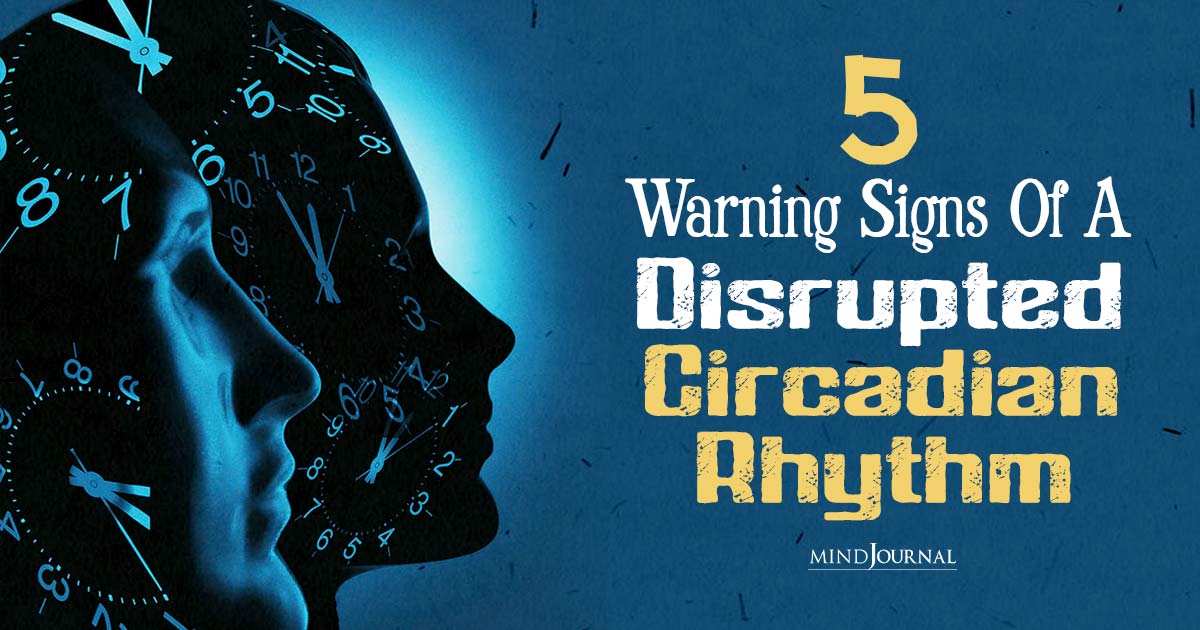When this natural rhythm is disrupted, it can lead to a cascade of health issues. Let’s take a look at 5 disrupted circadian rhythm symptoms that indicate it may be out of sync and provide practical solutions to restore harmony to your internal clock.
The circadian rhythm, often referred to as our body’s internal clock, plays a vital role in regulating our sleep-wake cycle and overall well-being.
When this rhythm is disrupted, it can lead to a host of health issues. In this article, we will explore five signs of circadian disruption and how to fix circadian rhythms that may be out of sync!

But before that let us take a look at the causes behind this circadian disruption:
- Irregular sleep schedules and inconsistent bedtime routines.
- Exposure to artificial light, especially at night.
- Shift work or frequently changing work hours.
- Jet lag due to rapid time zone shifts during travel.
- Use of electronic devices before bedtime.
5 Warning Signs You Have A Disrupted Circadian Rhythm
Symptom 1: Sleep Troubles
One of the most commondisrupted circadian rhythm symptoms is sleep disturbances. If you find yourself struggling to fall asleep at night, waking up frequently, or experiencing daytime drowsiness, your internal clock may be off-kilter.
For example, working late into the night or using electronic devices with bright screens before bedtime can confuse your body’s natural cues for sleep.
Solution: Establish a Consistent Sleep Schedule
To fix this issue, create a regular sleep schedule. Try to go to bed and wake up around the same time every day, even on weekends. This helps synchronize your body’s internal clock and improve the quality of your sleep.
Symptom 2: Mood Swings and Irritability
Disrupted circadian rhythms can also affect your mood. When your internal clock is out of sync, it can lead to mood swings, irritability, and even symptoms of depression. Shift workers and individuals with irregular schedules are particularly susceptible to this.
Solution: Prioritize Exposure to Natural Light
Expose yourself to natural daylight as much as possible, especially in the morning. Natural light helps reset your circadian rhythm and can improve mood. If you work indoors, take short breaks outside or consider using light therapy lamps.
Symptom 3: Weight Gain
Weight gain can be a surprising consequence of circadian disruption. Irregular eating patterns, late-night snacking, and inconsistent meal times can disrupt the body’s metabolism and lead to weight gain over time.
Solution: Practice Time-Restricted Eating
If you’re wondering how to fix circadian rhythm then establish regular meal times and limit eating to a specific window during the day. This approach, known as time-restricted eating, can help your body better regulate its metabolism and promote weight management.
Read more here: Why Working Before 10 Am Is Equivalent To Torture According To Science
Symptom 4: Decreased Cognitive Function
A disrupted circadian rhythm can impair cognitive function, leading to difficulties with concentration, memory, and problem-solving. This can be particularly problematic for students, shift workers, or anyone with an irregular schedule.
Solution: Optimize Sleep Quality
Improving sleep quality is crucial for cognitive function. Create a comfortable sleep environment, reduce exposure to screens before bedtime, and practice relaxation techniques to enhance the depth and restfulness of your sleep.
Symptom 5: Hormonal Imbalances
The circadian rhythm plays a significant role in regulating hormone release, including cortisol and melatonin. Disruption can lead to imbalances that affect energy levels, stress response, and overall well-being.
Solution: Manage Stress and Prioritize Self-Care
Stress management is essential for restoring hormonal balance. Engage in relaxation techniques such as meditation, yoga, or deep breathing exercises. Prioritizing self-care can help reduce the negative impact of stress on your circadian rhythm.
Maintaining a healthy circadian rhythm is crucial for overall well-being. By recognizing the disrupted circadian rhythm symptoms and implementing practical solutions on how to fix circadian rhythm, you can restore balance to your internal clock.
Read more here: 5 Sleep Tips that Can Help Ease Your Depression
Prioritize consistency in your daily routines and pay attention to the signals your body sends—you’ll be well on your way to a healthier, more harmonious circadian rhythm.










Leave a Reply